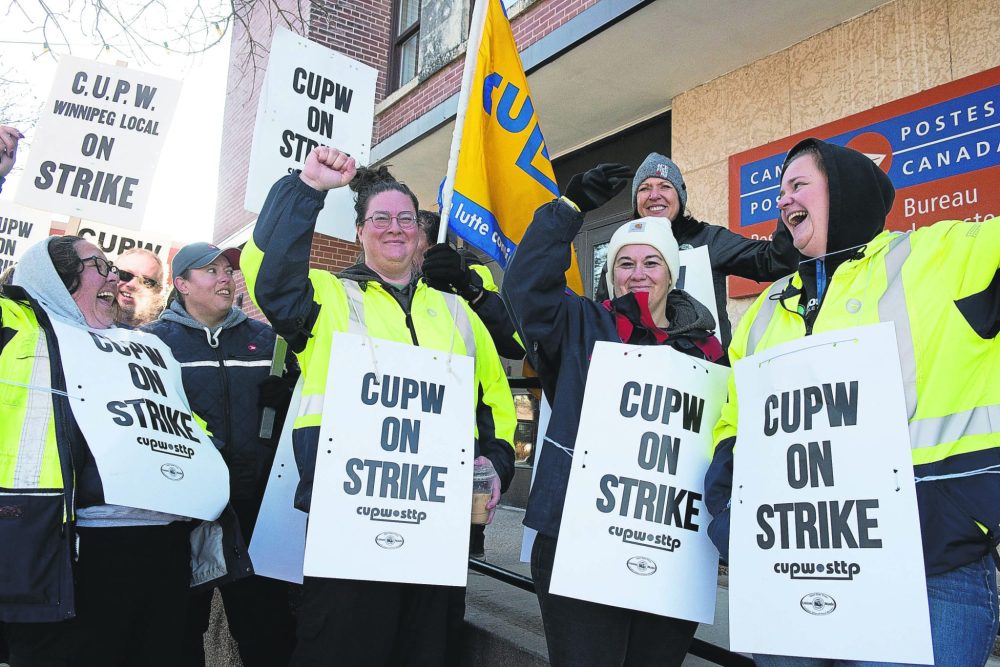Canada Post strike will delay deliveries of letters, parcels
Advertisement
Hey there, time traveller!
This article was published 02/06/2025 (213 days ago), so information in it may no longer be current.
Workers at Canada Post are striking again after talks stalled with the Crown corporation and the Canadian Union of Postal Workers.
While the 55,000 postal employees will continue to work there will be no overtime, which could result in delays for delivery of letters and parcels.
As a precaution, Southern Health is advising it will use telephone and email in place of letters when contacting patients and that “alternative mail couriers are in place to ensure the safe delivery of supplies.”

Manitoba Hydro is asking that customers do not put bill payments in the mail during the strike. It is asking customers to set up an online account or pre-authorized payments with their banks to avoid late payment charges.
The sticking points between the union and the Crown corporation are wages, benefits, and hours worked.
Canada Post is offering wage increases of six percent in year one; three percent in year two; and two percent in years three and four for both urban postal operations employees and rural and suburban mail carriers (RSMC). The union is looking for a 19 percent wage increase over four years. The estimated total pay for a postal worker is $61,921 per year, with an average annual salary hitting $54,632.
For urban employees, the corporation is also offering six added personal days, a minimum guarantee of 15 hours per week for part-time employees, and more opportunities for temporary employees to become permanent employees.
For RSMC, it is offering a minimum guarantee of 20 hours per week for permanent relief employees, six added personal days, better income replacement for leave, enhancements to pensionable service, and an hourly rate of pay system with breaks, lunches and daily overtime as needed.
Canada Post also wants to hire part-time workers to do weekend deliveries. Currently, full-time employees who do weekend work get paid overtime.
Canada Post also recently moved on some key sticking points in the negotiations. The company is no longer proposing a new health benefits plan, changes to employees’ post-retirement benefits, or enrolling future employees in the defined contribution pension.
The corporation will also give employees a signing bonus of $1,000 or $500, depending on their role; cost of living allowance payments would be triggered at a lower inflation threshold (7.16 percent, instead of 13.59 percent); letter carriers using the Dynamic Routing delivery model will continue to receive a per-piece payment for Neighbourhood Mail deliveries until January 1, 2030. The per piece payments are on top of actual time values for the urban units; and compulsory overtime will be removed, meaning the Corporation can no longer require employees to work mandatory overtime for urban units.
Among other demands, the union is asking for 10 additional paid medical days to the existing seven paid personal days and to allow workers to bank medical days. CUPW is also demanding significant improvements to the group benefits plans, including increased coverage for health specialists, fertility treatment, gender-affirming care, and vision care and precautionary cessation of work for pregnant and breastfeeding employees.
The Crown corporation posted a loss of more than $3 billion since 2018. In early 2025, the Government of Canada announced repayable funding of up to $1.034 billion for Canada Post to prevent insolvency.
A recent report by the Industrial Inquiry Commission stated Canada Post needed to make dramatic changes as it was essentially “bankrupt.” Seven changes were proposed including ending door-to-door delivery, except for businesses; end the moratorium on post office closures and conversion to community mail boxes; for weekend delivery and extra volume during the week, introduce part-time positions with the same working conditions and rates of pay of regular workers, prorated benefits, and pension; and create a simpler mechanism for stamp price increases.
“The impact of the ongoing uncertainty on our business is significant, but the impact on the Canadian economy is greater. By the end of last week our delivered parcel volumes were down by 50 percent over this time last year and continue to drop,” read a statement from Canada Post.
Canada Post workers went on strike seven months ago after almost two years of talks failed to produce a resolution. Then Minister of Labour Steven MacKinnon asked the Canadian Industrial Relations Board (CIRB) to order them back to work. The CIRB ruled in favour of the minister and the striking workers were back on the job on Dec. 17, 2024. As part of the ruling, Canada Post’s employee contracts were extended to May 22, 2025, so that negotiations could continue. Employees went on strike last Friday.
